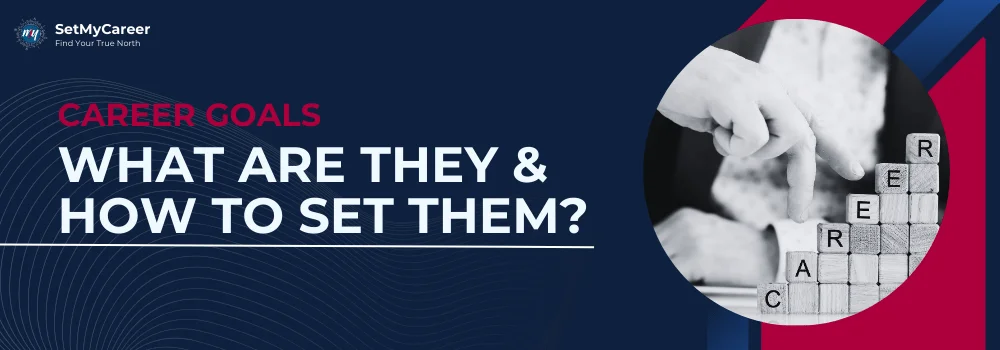Published by Jyothi Patil on 27 December 2023
Content Strategist | Editorial Team Member
Jyothi Patil is a skilled writer with a strong background in English literature, which she applies to crafting engaging content across various platforms. From writing blogs for her website and guest posts to creating pieces on Medium and Substack, Jyothi excels in making complex ideas easy to understand.
Uncover the meaning of career goals and learn effective strategies for setting them. This guide offers insights to help you define your aspirations and achieve professional success.

Have you ever gazed out your office window, hot coffee in hand, wondering if there is more to life than the daily grind? Do visions of career growth dance elusively, motivating you and taunting you in equal parts?
You are not alone. In a recent McKinsey study, 87% of surveyed employees hoped to develop new skills over the next year. However, only 24% had concrete plans to make it happen.
The difference? Those with clearly defined career goals manifest professional visions into reality through targeted objectives and actionable plans.
Career goals set the stage for continuous growth and advancement. They act as both compass and catalyst — pointing you toward greater responsibility, impact, and fulfillment while also enabling you to get there.
This article will navigate exactly how to transform nebulous aspirations into defined career goals that get results.
Beyond driving professional growth itself, career goals impart other benefits, as follows:
Employees who write down specific career goals tend to feel more motivated and purposeful in their day-to-day work. Having defined targets and milestones delivers an ongoing sense of momentum.
A Stanford study reveals that employees with written-down career goals feel up to 65% more motivated daily. Tracking progress against milestones delivers an ongoing dopamine boost.
Documenting your skills development and career advancement achievements over time is extremely appealing to hiring managers during promotion cycles. This showcases your ability to set and achieve long-term goals.
Ambitious employees want to see their career trajectories progress over time, not remain static. Dynamic goal setting and skills building make professionals more likely to stick with an organization longer term.
Clear Career Growth trajectories make employees 7X more likely to stay long-term compared to stagnant peers, according to Human Resources Executive.
The anecdotal evidence speaks for itself — setting career goals pays dividends across motivation, promotion potential, and retention. Companies that help facilitate career goal-setting and skills development among employees reap these benefits.

Before going further, it helps to contrast career goals against performance goals we may be more familiar with:
| Performance Goals | Career Goals |
|---|---|
| Tied to concrete, near-term work objectives | Map long-term professional aspirations |
| Focus on excelling in your current role | Develop skills and experience for future roles |
| Managed and evaluated directly by your manager | Directed more independently though the manager may provide input |
Transforming your career aspirations into reality starts with well-defined career goals. Follow these steps to craft meaningful and achievable career goals:
Reflect on where you see yourself in 5 or 10 years. Do you aim for a management role? To head up a new department? Outline the capabilities and experiences needed to get there. Let this end vision shape tangible near-term career goals.
Your most recent performance review likely highlighted strengths and development needs. Use these as input to shape relevant career goals. If leadership is an area for improvement, set goals to build those skills.
This methodology produces actionable career goals. Make them Specific, Measurable, Achievable, Relevant and Time-bound. Breaking bigger goals down into smaller milestones maintains momentum.
Ask your manager about larger organizational goals that your career goals can feed into. Shared alignment gets leadership buy-in and makes resource allocation easier.
Create a cadence to check in on goal progress made. Use a tracking chart to monitor milestones achieved. Assess what's working vs. not. Course correct as needed. Celebrate small wins.
Detail training, mentoring, and stretch assignments are needed to build skills. Leverage internal learning opportunities first before external ones. Collaborate with senior leadership to ensure support.
Budget or time constraints could jeopardize progress. Have workarounds in place so obstacles don't derail goals. Managers can help secure resources and provide oversight.
As priorities evolve, adjust goals as needed to adapt while maintaining momentum. Periodic check-ins allow for these reality checks to keep career goals on track.
Career goals manifest your boldest ambitions into reality. They provide direction, motivation, and a benchmark for capabilities critical to advancement.
By making goals SMART, tying them to milestones, and outlining regular progress checks, what once loomed distant moves increasingly within reach.
Soon you'll gaze out your office window, with the satisfaction of achievement instead of yearning for more! And then you’ll be ready to craft a new set of bolder career goals and repeat the cycle of purposeful, perpetual growth.
No. 14/595, 1st Floor, Nanjappa Reddy Layout, Koramangala 8th Block, Bangalore 560095